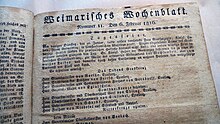Prince servant
Prince servants is one of Friedrich Schiller pejorative vice coined term for a - since the Enlightenment usually civil - courtier at the court of a prince .
History of the term
Prince servants initially designated a vassal of a prince without judgment. Ulrich von Hutten (1488–1523) described himself as such in a letter to Willibald Pirckheimer (1470–1530):
“The people from whom we draw our livelihoods are very poor farmers, to whom we lease our fields, vineyards, meadows and fields. The yield from it is very small in relation to the labor expended on it, but one worries and worries that it will be as great as possible; for we must be extremely prudent economists. We then also serve a prince from whom we hope for protection; if I don't do that, everyone believes they can do anything and anything against me. But for the prince servant too, this hope is associated with danger and fear every day. Because as soon as I set foot out of the house, there is a danger that I will run into people with whom the prince has spies and feuds and who attack me and lead me away captured. If I'm unlucky, I can give half of my wealth as a ransom and the protection I hoped for turns into the opposite. "
Weimar Classic
In the wake of the Enlightenment following Weimar Classics , the meaning of the term courtier moved into a derogatory term.
Goethe lets Metzler call him a prince servant or prince servant in the Götz von Berlichingen of 1773 (V, 5): “With you cowardly fellow! Prince servant! "
Goethe's own closeness to Duke Karl August von Sachsen-Weimar-Eisenach was already criticized during his time under the aspect that he was a prince servant. Goethe himself wrote in a letter to Johann Peter Eckermann in relation to this question: "Now it says again that I am a prince servant, a prince servant ...". Regarding Goethe's ennoblement by the Duke on June 3, 1782, Johann Gottfried Herder noted :
"So now he is ... the factotum of the Weimarschen and, God willing, soon the major domus of all Ernestine houses where he goes to worship."
“I cannot be a prince servant” says the Marquis von Posa in Schiller's 1787 drama Don Karlos . As a free Knight of Malta, the Marquis of Posa refuses to enter the service of King Philip II of Spain with these words .
19th century
The poet Georg Herwegh was a typical representative of the Vormärz and a counterpoint to Goethe, because he sees Goethe as a prince servant. The poet sees the new literary basis in journalism and no longer just working at court, as Goethe and Schiller once did. Herwegh appeals to poets in his “An die deutscher Dichter” not to fear the princes because poetry is immortal.
Herwegh, who was inclined to theatricality, spectacularly demonstrated the changed meaning of the term of the prince servant. On November 19, 1842, Herwegh received an audience with the Prussian King Friedrich Wilhelm IV. Instead of bowing goodbye, however, he fixed the king and quotes Schiller: "Sire, I cannot be a prince servant."
In this derogatory sense, the term has survived to this day. The Germanist Marie Haller-Nevermann wrote a biography of Schiller for the Schiller year 2005 with the title I can't be a prince servant , in which she examines the mental attitude and artistic personality of the “poet of freedom” .
literature
- Stefan Brakensiek: Prince servants, civil servants, citizens: administration and life of local civil servants in small towns in Lower Hesse 1750–1830. ISBN 3-525-35677-3 , Vandenhoeck & Ruprecht, Göttingen 1999
- Hans Meissner: The Doblhoffs and Baden-Weikersdorf. (From prince servant to industrial manager) . New Badener Blätter, Volume 4.4. Society of Friends of Baden and Municipal Collections - Archive, Rollett Museum of the City of Baden, Baden 1993.
Compare too
Web links
Individual evidence
- ↑ Werner Besch, Anne Betten, Sprachgeschichte: A manual for the history of the German language and its research , Volume 4, 2004, pp. 3080 and 3088
- ↑ Was Goethe a prince servant? in: Gero von Wilpert, Goethe: The 101 most important questions , 2007, p. 121f
- ↑ quoted from: Nicolas Boyle, Goethe: Der Dichter in seine Zeit , 1995, p. 392
- ^ Friedrich Schiller : Don Karlos . 3rd act, 10th appearance
